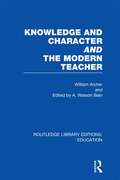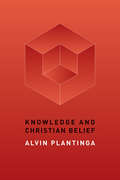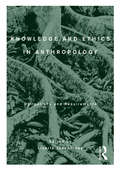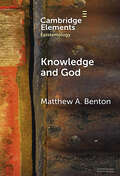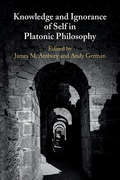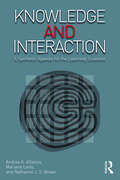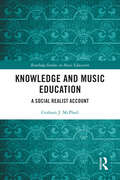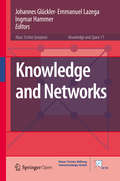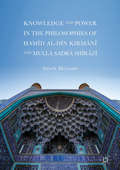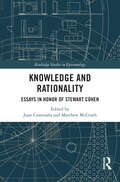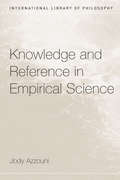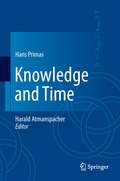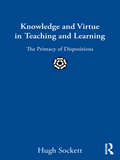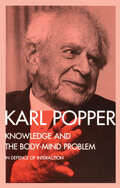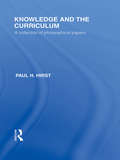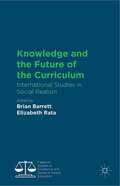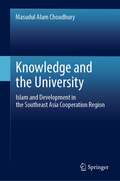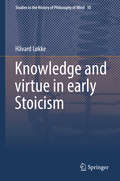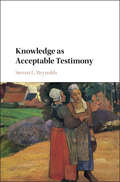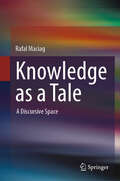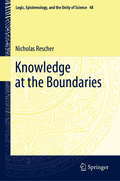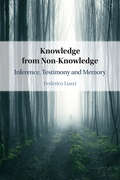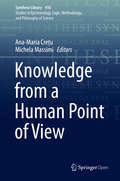- Table View
- List View
Knowledge and Character bound with The Modern Teacher (Routledge Library Editions: Education)
by William ArcherWritten before, but published after The First World War, this volume’s plea for a national system of education which will produce a nation of prosperous, morally fulfilled people able to live at peace with other nations is doubly poignant given the sacrifice of the ‘lost generation’. However, the author also sees the horror of the War as an opportunity to change human destiny through education, an opportunity to abandon the narrow system of education in favour of one which will ‘bring education in touch with life’ and provide Britain with the intellectual and moral efficiency necessary to steer her through the following turbulent years of the twentieth century. Covering the core subjects of the English school curriculum in the early twentieth century the chapters in The Modern Teacher, if somewhat utopian, describe best practice in teaching of the particular subject and suggest possible improvements. One chapter also discusses the importance of the relatively new subject of citizenship, as well as the moral education of pupils.
Knowledge and Christian Belief
by Alvin PlantingaIn his widely praised Warranted Christian Belief (Oxford, 2000) Alvin Plantinga discussed in great depth the question of the rationality, or sensibility, of Christian belief. In this book Plantinga presents the same ideas in a briefer, much more accessible fashion.Recognized worldwide as a leading Christian philosopher, Plantinga probes what exactly is meant by the claim that religious -- and specifically Christian -- belief is irrational and cannot sensibly be held. He argues that the criticisms of such well-known atheists as Richard Dawkins, Daniel Dennett, Sam Harris, and Christopher Hitchens are completely wrong. Finally, Plantinga addresses several potential “defeaters” to Christian belief -- pluralism, science, evil and suffering -- and shows how they fail to successfully defeat rational Christian belief.
Knowledge and Ethics in Anthropology: Obligations and Requirements (Criminal Practice Ser. #31)
by Lisette JosephidesInspired by the work of world-renowned anthropologist Marilyn Strathern, this collection of essays features contributions from a range of internationally recognized scholars – including Strathern herself – which examine a range of methodologies and approaches to the anthropology of knowledge.The book investigates the production of knowledge through a variety of themes, centered on the question of the researcher’s obligations and the requirements of knowledge. These range from the obligation to connect with local culture and existing anthropological knowledge, to the need to draw conclusions and circulate what has been learned. Taking up themes that are relevant for anthropology as a whole – particularly the topic of knowledge and the ethics of knowing others, as well as the notion of the local in a global world – Knowledge and Ethics in Anthropology is key reading for students and scholars alike. A thorough introduction to the key concepts and terms used in Strathern’s work is provided, making this a fantastic resource for anyone encountering her work for the first time.
Knowledge and God (Elements in Epistemology)
by Matthew A. BentonThis Element examines a main theme in religious epistemology, namely, the possibility of knowledge of God. Most often philosophers consider the rationality or justification of propositional belief about God, particularly beliefs about the existence and nature of God; and they will assess the conditions under which, if there is a God, such propositional beliefs would be knowledge, particularly in light of counter-evidence or the availability of religious disagreement. This Element surveys such familiar areas, then turns toward newer and less-developed terrain: interpersonal epistemology, namely what it is to know another person. It then explores the prospects for understanding what it might take to know God relationally, the contours of which are significant for many theistic traditions.
Knowledge and Ignorance of Self in Platonic Philosophy
by Andy German James M. AmburyKnowledge and Ignorance of Self in Platonic Philosophy is the first volume of essays dedicated to the whole question of self-knowledge and its role in Platonic philosophy. It brings together established and rising scholars from every interpretative school of Plato studies, and a variety of texts from across Plato's corpus - including the classic discussions of self-knowledge in the Charmides and Alcibiades I, and dialogues such as the Republic, Theaetetus, and Theages, which are not often enough mined for insights about this crucial philosophical topic. The rich variety of readings and hermeneutical methods (as well as the comprehensive research bibliography included in the volume) allows for an encompassing view of the relevant scholarly debates. The volume is intended to serve as a standard resource for further research on Plato's treatment of self-knowledge, and will highlight the relevance of Plato's thought to contemporary debates on selfhood, self-reflection and subjectivity.
Knowledge and Interaction: A Synthetic Agenda for the Learning Sciences
by Andrea A. DiSessa Mariana Levin Nathaniel J.S. BrownDecades of research in the cognitive and learning sciences have led to a growing recognition of the incredibly multi-faceted nature of human knowing and learning. Up to now, this multifaceted nature has been visible mostly in distinct and often competing communities of researchers. From a purely scientific perspective, "siloed" science—where different traditions refuse to speak with one another, or merely ignore one another—is unacceptable. This ambitious volume attempts to kick-start a serious, new line of work that merges, or properly articulates, different traditions with their divergent historical, theoretical, and methodological commitments that, nonetheless, both focus on the highly detailed analysis of processes of knowing and learning as they unfold in interactional contexts in real time. Knowledge and Interaction puts two traditions in dialogue with one another: Knowledge Analysis (KA), which draws on intellectual roots in developmental psychology and cognitive modeling and focuses on the nature and form of individual knowledge systems, and Interaction Analysis (IA), which has been prominent in approaches that seek to understand and explain learning as a sequence of real-time moves by individuals as they interact with interlocutors, learning environments, and the world around them. The volume’s four-part organization opens up space for both substantive contributions on areas of conceptual and empirical work as well as opportunities for reflection, integration, and coordination.
Knowledge and Music Education: A Social Realist Account (Routledge Studies in Music Education)
by Graham J. McPhailKnowledge and Music Education: A Social Realist Account explores current challenges for music education in relation to wider philosophical and political debates, and seeks to find a way forward for the field by rethinking the nature and value of epistemic knowledge in the wake of postmodern critiques. Focusing on secondary school music, and considering changes in approaches to teaching over time, this book seeks to understand the forces at play that enhance or undermine music’s contribution to a socially just curriculum for all. The author argues that the unique nature of disciplinary-derived knowledge provides students with essential cognitive development, and must be integrated with the turn to more inclusive, student-centred, and culturally responsive teaching. Connecting theoretical issues with concrete curriculum design, the book considers how we can give music students the benefits of specialised subject knowledge without returning to a traditional past.
Knowledge and Networks
by Johannes Glückler Emmanuel Lazega Ingmar HammerThis book discusses a core question in many fields of the social sciences, namely how to create, share and adopt new knowledge. It creates an original space for conversation between two lines of research that have developed largely in parallel for a long time: social network theory and the geography of knowledge. This book considers that relational thinking has become increasingly important for scholars to capture societal outcomes by studying social relations and networks, whereas the role of place, space and spatial scales has been somewhat neglected outside an emergent geography of knowledge. The individual contributions help integrate network arguments of connectivity, geographical arguments of contiguity and contextuality into a more comprehensive understanding of the ways in which people and organizations are constrained by and make use of space and networks for learning and innovation. Experts in the fields of geography, sociology, economics, political science, psychology, management and organizational studies develop conceptual models and propose empirical research that illustrates the ways in which networks and geography play together in processes of innovation, learning, leadership, and power. This book is open access under a CC BY 4. 0 license.
Knowledge and Power in the Philosophies of Ḥamīd al-Dīn Kirmānī and Mullā Ṣadrā Shīrāzī
by Sayeh MeisamiThis book is a comparative study of two major Shīʿī thinkers Ḥamīd al-Dīn Kirmānī from the Fatimid Egypt and Mullā Ṣadrā from the Safavid Iran, demonstrating the mutual empowerment of discourses on knowledge formation and religio-political authority in certain Ismaʿili and Twelver contexts. The book investigates concepts, narratives, and arguments that have contributed to the generation and development of the discourse on the absolute authority of the imam and his representatives. To demonstrate this, key passages from primary texts in Arabic and Persian are translated and closely analyzed to highlight the synthesis of philosophical, Sufi, theological, and scriptural discourses. The book also discusses the discursive influence of Naṣīr al-Dīn Ṭūsī as a key to the transmission of Ismaʿili narratives of knowledge and authority to later Shīʿī philosophy and its continuation to modern and contemporary times particularly in the narrative of the guardianship of the jurist in the Islamic Republic of Iran.
Knowledge and Rationality: Essays in Honor of Stewart Cohen (Routledge Studies in Epistemology)
by Juan Comesaña and Matthew McGrathThis book features original essays on knowledge and rationality as related to the work of Stewart Cohen. This is the first volume dedicated to Cohen, one of the most influential epistemologists of the last several decades.Stewart Cohen is responsible for introducing the New Evil Demon problem, the problem of easy knowledge, and epistemic contextualism. Any one of these contributions is sufficient by itself to establish a lasting philosophical legacy. The chapters in this book reflect Cohen’s legacy and address a variety of important topics related to his work, including the New Evil Demon problem, epistemic justification, epistemic contextualism, pragmatic and moral encroachment, epistemic obligations, skepticism, and the problem of easy knowledge. The book also includes a complete bibliography of Cohen’s works.Knowledge and Rationality is an essential resource for scholars and advanced students in epistemology with an interest in engaging with Stewart Cohen’s philosophy.
Knowledge and Reference in Empirical Science (International Library of Philosophy)
by Jody AzzouniKnowledge and Reference in Empirical Science is a fascinating study of the bounds between science and language: in what sense, and of what, does science provide knowledge? Is science an instrument only distantly related to what's real? Can the language of science be used to adequately describe the truth? In this book, Jody Azziouni investigates the technology of science - the actual forging and exploiting of causal links, between ourselves and what we endeavor to know and understand.
Knowledge and Time
by Harald Atmanspacher Hans PrimasThis is a unique volume by a unique scientist, which combines conceptual, formal, and engineering approaches in a way that is rarely seen. Its core is the relation between ways of learning and knowing on the one hand and different modes of time on the other. Partial Boolean logic and the associated notion of complementarity are used to express this relation, and mathematical tools of fundamental physics are used to formalize it. Along the way many central philosophical problems are touched and addressed, above all the mind-body problem. Completed only shortly before the death of the author, the text has been edited and annotated by the author's close collaborator Harald Atmanspacher.
Knowledge and Virtue in Teaching and Learning: The Primacy of Dispositions
by Hugh SockettThe challenge this book addresses is to demonstrate how, in teaching content knowledge, the development of intellectual and moral dispositions as virtues is not merely a good idea, or peripheral to that content, but deeply embedded in the logic of searching for knowledge and truth. It offers a powerful example of how philosophy of education can be brought to bear on real problems of educational research and practice – pointing the reader to re-envision what it means to educate children (and how we might prepare teachers to take on such a role) by developing the person, instead of simply knowledge and skills. Connected intimately to the practice of teaching and teacher education, the book sets forth an alternative theory of education where the developing person is at the center of education set in a moral space and a political order. To this end, a framework of public and personal knowledge forms the content, to which personal dispositions are integral, not peripheral. The book’s pedagogy is invitational, welcoming its readers as companions in inquiry and thought about the moral aspects of what we teach as knowledge.
Knowledge and the Body-Mind Problem: In Defence of Interaction
by Karl PopperFirst published in 1995. Routledge is an imprint of Taylor & Francis, an informa company.
Knowledge and the Curriculum (International Library of the Philosophy of Education Volume 12): A Collection of Philosophical Papers
by Paul H. HirstThe papers in this volume provide a coherent philosophical study of a group of important and pressing educational issues such as the selection of objectives for less able children, the fundamental characteristics of teaching and the integration of the curriculum. A thesis on the necessary differentiation of knowledge into logically distinct forms is outlined, and is defended against recent philosophical criticisms. Its implications for curriculum planning are examined, with particular reference to the urgent problems of adeqately characterizing liberal education and those forms of moral and religious education that are appropriate in maintained schools.
Knowledge and the Future of the Curriculum
by Brian Barrett Elizabeth RataThis collection explores why powerful knowledge matters for social justice and discusses its implications for curriculum and pedagogy. The contributors argue that the purpose of education is to provide all students with access to powerful knowledge so that they acquire the means to move beyond their experiences and enhance their lives.
Knowledge and the Gettier Problem
by Stephen HetheringtonEdmund Gettier's 1963 verdict about what knowledge is not has become an item of philosophical orthodoxy, accepted by philosophers as a genuine epistemological result. It assures us that - contrary to what Plato and later philosophers have thought - knowledge is not merely a true belief well supported by epistemic justification. But that orthodoxy has generated the Gettier problem - epistemology's continuing struggle to understand how to accommodate Gettier's apparent result within an improved conception of knowledge. In this book, Stephen Hetherington argues that none of epistemology's standard attempts to solve that problem have succeeded: he shows how subtle yet fundamental mistakes - regarding explication, methodology, properties, modality, and fallibility - have permeated those responses to Gettier's challenge. His fresh and original book outlines a new way of solving the problem, and an improved grasp of Gettier's challenge and its significance is the result. In a sense, Plato can now embrace Gettier.
Knowledge and the University: Islam and Development in the Southeast Asia Cooperation Region
by Masudul Alam ChoudhuryThis book looks at a substantively new model of educational philosophy and its application within the field of tertiary education, in relation to socio-economic development in Southeast Asian members of the Organization of Islamic Conferences (OIC). Focusing on and drawing from the cross-regional South East Asian Cooperation (SEACO), a network promoting regional economic cooperation, the author presents a thoughtful evocation of a new orientation to educational philosophy and policy within the development context in the time of, and relating to, COVID-19. The generalized worldview of Islamic educational and socio-economic development model is laid down in relation to the philosophy of education and an ethical-scientific structure of development in terms of the theory of knowledge (epistemology, episteme). The foundation of scientific thought and a comparative Islamic worldview in understanding the unified reality of ‘everything’ is presented. The objectivity of socio-scientific learning at all levels of educational development is further explained within the context of SEACO and its think tank vis-à-vis a reconstructive perspective in which the Islamic episteme of the unity of knowledge and its substantive methodology is addressed and unpacked. The book is relevant to policymakers and scholarly researchers in Islamic philosophy and development and higher education in Southeast Asia and in the Muslim world and more broadly for the world of learning.
Knowledge and virtue in early Stoicism
by Håvard LøkkeThis book is about the epistemological views and arguments of the early Stoics. It discusses such questions as: How is knowledge possible, and what is it? How do we perceive things and acquire notions of them? Should we rely on arguments? How do we come to make so many mistakes? The author tries to give a comprehensive and conservative account of Stoic epistemology as a whole as it was developed by Chrysippus. He emphasizes how the epistemological views of the Stoics are interrelated among themselves and with views from Stoic physics and logic. There are a number of Stoic views and arguments that we will never know about. But there are passages on Stoic epistemology in Sextus Empiricus, Galen, Plutarch, Cicero, and a few others authors. The book is like a big jigsaw puzzle of these scattered pieces of evidence.
Knowledge and virtue in early Stoicism (Studies in the History of Philosophy of Mind #10)
by Håvard LøkkeThis book is about the epistemological views and arguments of the early Stoics. It discusses such questions as: How is knowledge possible, and what is it? How do we perceive things and acquire notions of them? Should we rely on arguments? How do we come to make so many mistakes?The author tries to give a comprehensive and conservative account of Stoic epistemology as a whole as it was developed by Chrysippus. He emphasizes how the epistemological views of the Stoics are interrelated among themselves and with views from Stoic physics and logic.There are a number of Stoic views and arguments that we will never know about. But there are passages on Stoic epistemology in Sextus Empiricus, Galen, Plutarch, Cicero, and a few others authors. The book is like a big jigsaw puzzle of these scattered pieces of evidence.
Knowledge as Acceptable Testimony
by Reynolds Steven L.Standard philosophical explanations of the concept of knowledge invoke a personal goal of having true beliefs, and explain the other requirements for knowledge as indicating the best way to achieve that goal. In this highly original book, Steven L. Reynolds argues instead that the concept of knowledge functions to express a naturally developing kind of social control, a complex social norm, and that the main purpose of our practice of saying and thinking that people 'know' is to improve our system for exchanging information, which is testimony. He makes illuminating comparisons of the knowledge norm of testimony with other complex social norms - such as those requiring proper clothing, respectful conversation, and the complementary virtues of tact and frankness - and shows how this account fits with our concept of knowledge as studied in recent analytic epistemology. His book will interest a range of readers in epistemology, psychology, and sociology.
Knowledge as a Tale: A Discursive Space
by Rafal MaciagThis text describes the process that led to knowledge becoming the most important modern good and a complex phenomenon beginning at the end of the 19th century. It was a change in the way of understanding the world proposed by mathematics and geometry. This volume reveals how the paradigm shift, still in progress, is gradually transforming less obvious fields of science, such as the humanities and social sciences while affecting the phenomenon of knowledge. Firstly, meta-analysis gained importance, and secondly, it became natural to perceive knowledge in a social context, showing its diverse and multi-cause dispersion, leading to the phenomenon of knowledge. Due to the interpretation of knowledge as a complex social phenomenon, the author proposes a new model of knowledge description, called the theory of discursive space, making it possible to describe the role and meaning of knowledge as a component of modern civilization that is all-encompassing. This text appeals to students and researchers working in the philosophy of technology.
Knowledge at the Boundaries (Logic, Epistemology, and the Unity of Science #48)
by Nicholas RescherThe book offers a reflection on the nature, scope, and limits of knowledge that have been at the focus of the author's work over decades. The essays collected in this volume expound and extend these efforts in exploring the outer fringes of understanding: the outer boundaries of conceivability, the limits of cognition, and the ramifications of ineffability and paradox. They join in exploring the lay of the land at the boundaries of knowledge.The first chapters address basic facts regarding the conceptualization of knowledge. This is followed by a study on how to deal with problems relating to the affirmation and considerations of truth. The final chapters scrutinize the limits of demonstration and the inherent impossibility of realizing an ideal systematization of our knowledge of totalities. The book affords novel perspectives regarding the thought of a widely appreciated philosopher. It is an original work aimed for readers interested in the theory of knowledge and philosophy of cognition.
Knowledge from Non-Knowledge: Inference, Testimony and Memory
by Federico LuzziAccording to the received view in epistemology, inferential knowledge from non-knowledge is impossible - that is, in order for a subject to know the conclusion of their inference, they must know the essential premises from which that conclusion is drawn. In this book, Federico Luzzi critically examines this view, arguing that it is less plausible than intuition suggests and that it can be abandoned without substantial cost. In a discussion that ranges across inference, testimony and memory he analyses the full range of challenges to the view, connecting them to epistemological cases that support those challenges. He then proposes a defeater-based framework which allows the phenomenon of knowledge from non-knowledge across these three epistemic areas to be better understood. His book will be of interest to a wide range of readers in epistemology.
Knowledge from a Human Point of View (Synthese Library #416)
by Michela Massimi Ana-Maria CrețuThis open access book – as the title suggests – explores some of the historical roots and epistemological ramifications of perspectivism. Perspectivism has recently emerged in philosophy of science as an interesting new position in the debate between scientific realism and anti-realism. But there is a lot more to perspectivism than discussions in philosophy of science so far have suggested. Perspectivism is a much broader view that emphasizes how our knowledge (in particular our scientific knowledge of nature) is situated; it is always from a human vantage point (as opposed to some Nagelian "view from nowhere"). This edited collection brings together a diverse team of established and early career scholars across a variety of fields (from the history of philosophy to epistemology and philosophy of science). The resulting nine essays trace some of the seminal ideas of perspectivism back to Kant, Nietzsche, the American Pragmatists, and Putnam, while the second part of the book tackles issues concerning the relation between perspectivism, relativism, and standpoint theories, and the implications of perspectivism for epistemological debates about veritism, epistemic normativity and the foundations of human knowledge.
